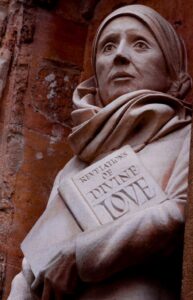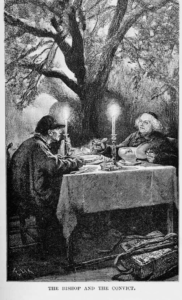[vc_row row_padding_bottom=”30″][vc_column][textbox title=”The Singularity of Grace” title_color=”#2f2f2f” title_fontsize=”40″ text_under_align=”center” subtitle=”Cherie Harder” subtitle_color=”#757575″ content_align=”center”][/vc_column][/vc_row][vc_row][vc_column width=”1/6″ css=”.vc_custom_1547644032611{margin-top: 20px !important;border-top-width: 0px !important;padding-top: 10px !important;padding-right: 10px !important;padding-bottom: 10px !important;padding-left: 10px !important;background-color: #eeeeee !important;border-top-style: solid !important;}”][imagebox image_url=”14483″ image_hover=”disable”][/vc_column][vc_column width=”5/6″][vc_column_text]
Monday, December 23, 2013
In What’s So Amazing About Grace? author Phillip Yancey recounts:
During a British conference on comparative religions, experts from around the world debated what, if any, belief was unique to the Christian faith. They began eliminating possibilities. Incarnation? Other religions had different versions of gods’ appearing in human form. Resurrection? Again, other religions had accounts of return from death. The debate went on for some time until C. S. Lewis wandered into the room. “What’s the rumpus about?” he asked, and heard in reply that his colleagues were discussing Christianity’s unique contribution among world religions. Lewis responded, “Oh, that’s easy. It’s grace.”
Lewis was not asserting that other faiths did not value or extol mercy or kindness, but that they each posit steps to earning a deity’s approval (or at least placating divine anger), rather than declare the love of God as a gift to be received. It is hard to overstate how radical the doctrine of grace must have seemed – the idea that God’s love was offered freely even to lowlifes and losers; that it could not be earned, no matter how hard one tried; that even the best of humanity could not claim an entitlement, while the worst of the lot could still receive the gift.
The implications were incredible. It had been long and widely believed, even assumed, that those who prospered had earned supernatural favor; those who suffered had culpably piqued some deity. One got what was coming to him. The idea of grace offered a new lens through which to view the reality that we each experience both suffering we did not cause and goodness we do not deserve. It invigorated the virtue of gratitude, which requires recognition of blessings to which one is not entitled. And it made possible a new realization of forgiveness, and the spiritual freedom that attends it.
Of course, the Christian conception of grace was not merely the introduction of a doctrine, but the arrival of its incarnation. And once Grace showed up, He turned the world upside down. The late philosopher Dallas Willard spoke of “The Great Inversion” in which Jesus demonstrated, through his revolutionary way of life, a new way of understanding God, the world, other people, reality as we know it. He deliberately flouted the metrics of virtue and respectability in his age, choosing to heal the sick on the Sabbath, hang out with scoundrels, speak privately with women, even verbally assault clerics. He forgave and healed those who asked, even when it broke the law to do so. He claimed that “abundant life” was realized apart from position or wealth, and asserted that love of God and neighbor was the highest end and deeper purpose of elaborately codified laws.
He did not give easy answers to the deep questions of pain and suffering, but offered himself as a means to wisdom and understanding. His arrival was steeped in humiliation – a suspect birth, in a dirty cave outside a backwater town. His brief life was terminated by a horrific death – flailed to deformation, nailed naked to crossbeams between criminals, jeered and taunted by crowds. Yet he lived to show that Grace overcomes not merely the petty powers of the day, but the great powers of darkness and death. The world has never seen His like.
The season of Advent anticipates not only the coming of Grace over two millennia ago, but also a second arrival. In our modern age, such a hope may seem foolish and fantastical, the googly-eyed dogma of religious primativists. Yet the orthodox Christian faith has always held out this promise – that Grace will return again, to make all things new. It is this hope that is foreshadowed in the individual transformations of Grace-struck lives, as well as the birth we celebrate this week:
Come, thou long expected Jesus,
Born to set thy people free;
From our fears and sins release us,
Let us find our rest in thee.
Israel’s strength and consolation.
Hope of all the earth thou art;
Dear desire of every nation,
Joy of every longing heart.
Warmly,
Cherie Harder
President
Recommended Readings & Resources:
* Philip Yancey, What’s So Amazing About Grace? Zondervan Publishing House, 1997.
* Eugene H. Peterson, The Jesus Way, William B. Eerdmans Publishers, 2007.
* Dallas Willard, The Divine Conspiracy, HarperCollins, 1997.
* John Pollock, Amazing Grace, The Trinity Forum Reading, 2001.
* G.K. Chesterton, The Strangest Story in the World, The Trinity Forum Reading, 2009.
* Victor Hugo, The Purchase of a Soul, The Trinity Forum Reading, 2010.
* Flannery O’Connor, Revelation, The Trinity Forum Reading, 2005.
* Isak Dinesan, Babette’s Feast, The Trinity Forum Reading, 2010.
[/vc_column_text][/vc_column][/vc_row]


